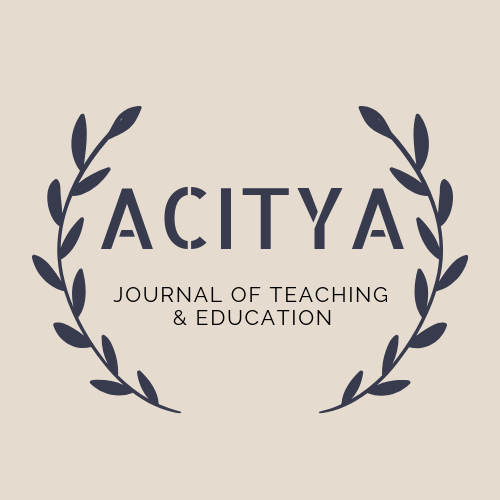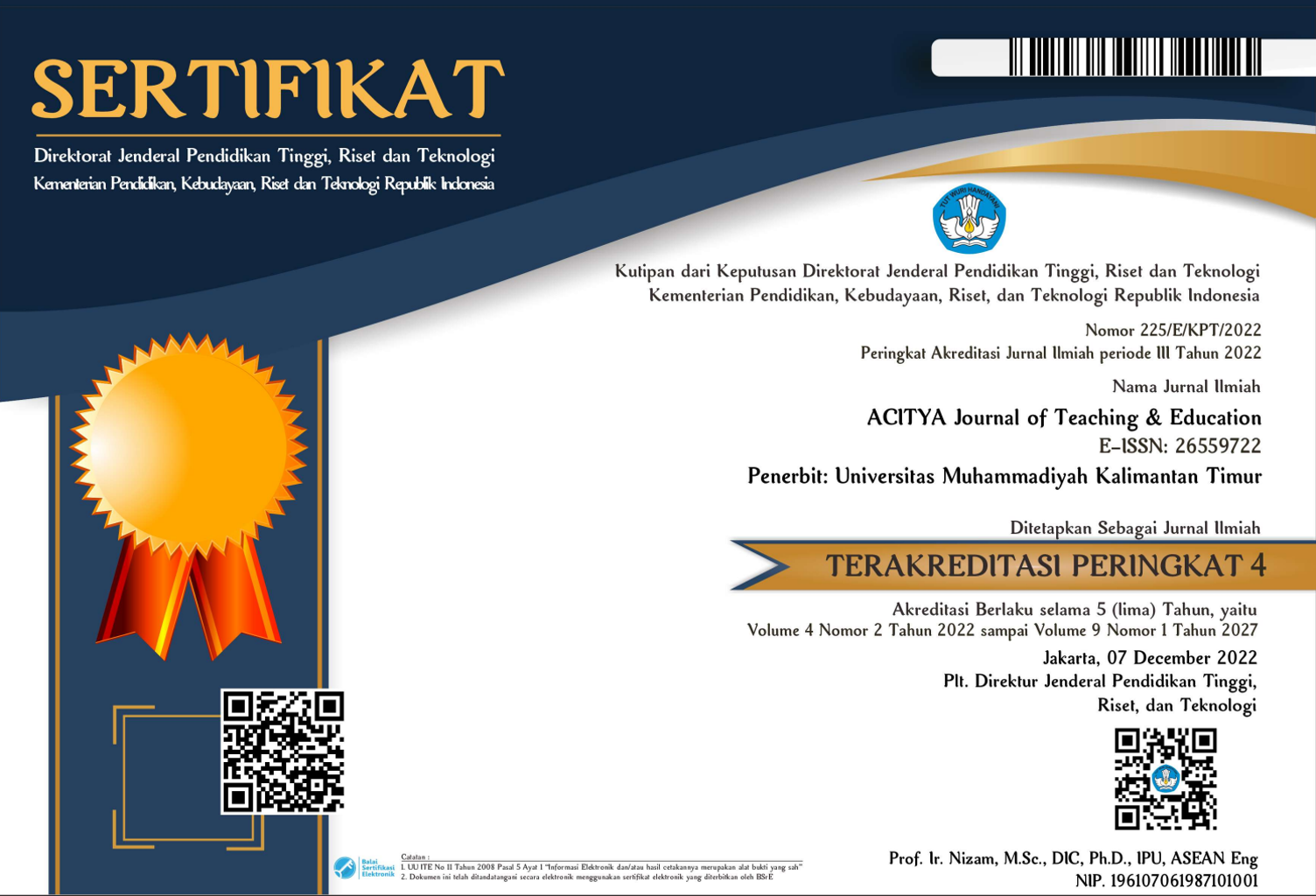Examining Moves and Steps in Discussion Chapters of TEFL Master’s Theses by Indonesian Postgraduates: A Genre Analysis
DOI:
https://doi.org/10.30650/ajte.v6i2.3955Keywords:
academic writing, discussion section, genre analysis, Indonesian postgraduates, TEFL master's thesesAbstract
The discussion chapter holds a paramount position in a thesis, being regarded as the most crucial and challenging part to compose, particularly for university students. The present genre investigation highlighted the focus on language use and communicative practices. This research seeks to investigate the rhetorical organization, moves, and steps, employed by Indonesian postgraduates while writing the discussion chapter of their theses within the field of Teaching English as a Foreign Language (TEFL). We examined five theses from postgraduate students whose data were obtained from the university repository. Data were analyzed with the framework proposed by Chen and Kuo (2012). The overall word count is 9204 words. From the analysis conducted, it was found that Move 2 Step 1: Reporting major findings (41.4%), Move 4 Step 2: comparing the results with literature (21.9%), and Move 4 Step 3: accounting for results (20.7%) were highly used in the data. However, two steps were least used in the data; namely, Move 3 Step 1: making conclusions of results and Move 6 Step 2: indicating the significance of the study. Our findings provide insights into how postgraduates structure their arguments, present findings, and interact with existing literature.
Downloads
References
Adelita, D. (2023). Challenges and Strategies in Writing Research Articles for Publication: A Case Study of Indonesian EFL Undergraduate Students. Master’s Thesis. Universitas Islam Negeri Sumatera Utara. http://repository.uinsu.ac.id/
Anwar, K. (2010). Rhetorical Patterns of Research Articles in Language Teaching Journals. Doctoral thesis. Universitas Negeri Malang. https://repository.um.ac.id/64397/
Arsyad, S. (2013). A Genre-Based Analysis on Discussion Section of Research Articles in Indonesian Written by Indonesian Speakers. International Journal of Linguistics, 5(4), 50–70. https://doi.org/10.5296/ijl.v5i4.3773
Asari, S., Kurnia, F. D., & Suharsono. (2018). Ideas Pattern Manifested in Rhetorical Moves of English Language Teaching and Learning Research Articles Discussion Written by Indonesian English Academics. ELite Journal : International Journal of Education, Language, and Literature E-ISSN, 1(1), 83–92. https://journal.unesa.ac.id/index.php/elite
Balakumar, P., Al-Qahtani, A., Shanmugam, K., Srividhya, P. ., & Sundram, K. (2023). In The Quintessence of Basic and Clinical Research and Scientific Publishing. In How to Efficiently Write a Persuasive Discussion Section (pp. 755–760).
Basturkmen, H. (2012). A genre-based investigation of discussion sections of research articles in Dentistry and disciplinary variation. Journal of English for Academic Purposes, 11(2), 134–144. https://doi.org/10.1016/j.jeap.2011.10.004
Batubara, M. H. (2022). The Effect of Duolingo Utilization on Indonesian Adolescent EFL Learners’ Vocabulary Mastery and Academic Self-Efficacy. Master’s Thesis. Universitas Islam Negeri Sumatera Utara. http://repository.uinsu.ac.id/
Carter-Thomas, S., & Rowley-Jolivet, E. (2020). Three Minute Thesis presentations: Recontextualisation strategies in doctoral research. Journal of English for Academic Purposes, 48. https://doi.org/10.1016/j.jeap.2020.100897
Chen, T., & Kuo, C. (2012). A genre-based analysis of the information structure of master’s theses in applied linguistics. The Asian ESP Journal, 8(1), 24–52.
Devira, M., Purwati, Isda, I. D., Baihaqi, & Firman. (2021). A Structural Move Analysis in the Introduction Section of Indonesian EFL Undergraduate Students’ Theses. Proceedings of AICS-Social Sciences, 11, 11, 64–70.
Holmes, R. (1997). Genre analysis, and the social sciences: An investigation of the structure of research article discussion sections in three disciplines. English for Specific Purposes, 16(4), 321–337. https://doi.org/10.1016/S0889-4906(96)00038-5
Irawati, L., Saukah, A., & Suharmanto. (2018). Indonesian authors writing their discussion sections both in English and Indonesian research articles. Jurnal Cakrawala Pendidikan, 37(3), 447–456.
Khairisya, T. (2023). Utilizing Computer-Mediated Corrective Feedback in Academic Writing: A Focus on EFL Master Students’ Preferences and Perceptions. Master’s Thesis. Universitas Islam Negeri Sumatera Utara. http://repository.uinsu.ac.id/
Linuwih, E. R., Setiawan, S., & Munir, A. (2021). EFL Student and Supervisor Perceptions of the Difficulties in Writing Undergraduate Thesis Results and Discussion Section Universitas Negeri Surabaya , Surabaya 60213 , Indonesia. 470–479.
Loan, N. T. T., & Pramoolsook, I. (2015). Move analysis of results-discussion chapters in TESOL Master’s theses written by Vietnamese students. 3L: Language, Linguistics, Literature, 21(2), 1–15. https://doi.org/10.17576/3l-2015-2102-01
Lubis, A. H. (2019). The argumentation structure of research article ‘findings and discussion’ sections written by Non-native English speaker novice writers: a case of Indonesian undergraduate students. Asian Englishes, 22(2), 143–162. https://doi.org/10.1080/13488678.2019.1669300
Martella, R. C., Nelson, J. R., Morgan, R. L., & Marchand-Matella, N. E. (2013). Understanding and Interpreting Educational Research. Guilford Press.
Maschio, F. (2006). the Importance of English Language in the Education of European Jurists: Recent Developments in the Italian Academic Scenario. European Journal of Legal Education, 3(2), 135–142. https://doi.org/10.1080/16841360701835545
Peacock, M. (2002). Communicative moves in the discussion section of research articles. System, 30, 479–497. https://doi.org/10.1016/S0346-251X(02)00050-7
Pieketaleyee, A., & Bazargani, D. T. (2018). Exploring the Moves and Steps in TEFL M.A. Theses Introduction and Review of Literature PowerPoint Presentations: A Genre Analysis Approach. Theory and Practice in Language Studies, 8(9), 1186. https://doi.org/10.17507/tpls.0809.12
Rahayu, T., Aziz, M., & Maftuh, M. F. (2023). ELTR Journal, e-ISSN 2579-8235 ,. ELTR JOURNAL: English Language Education Study Program Association, Indonesia, 7(1), 34–46.
Redaksi. (2021). Cara Penulisan Hasil dan Pembahasan untuk Artikel Ilmiah. https://uinsgd.ac.id/cara-penulisan-hasil-dan-pembahasan-untuk-artikel-ilmiah/
Sari, W. (2023). Teaching of Higher Order Thinking Skills (HOTS) In English Language Teaching At Junior High Schools. Master’s Thesis. Universitas Islam Negeri Sumatera Utara. http://repository.uinsu.ac.id/
Simandan, D. (2019). Revisiting positionality and the thesis of situated knowledge. Dialogues in Human Geography, 9(2), 129–149. https://doi.org/10.1177/2043820619850013
Swales, J. (1990). Genre Analysis: English in Academic and Research Settings. Cambridge University Press.
Syahnaz, M. (2023). Artificial Intelligence-Integrated Language Learning: An Investigation Of Quillbot Utilization In EFL Students’ Academic Writing. Master’s Thesis. Universitas Islam Negeri Sumatera Utara. http://repository.uinsu.ac.id/
Wagener, B. (2018). The importance of affects, self-regulation and relationships in the writing of a master’s thesis. Teaching in Higher Education, 23(2), 227–242. https://doi.org/10.1080/13562517.2017.1379480
Warsito, W., Arsyad, S., & Harahap, A. (2017). Stating and Defending New Knowledge Claim: a Rhetorical Analysis on the Discussion Section of English Master Thesis By Indonesian Efl Learners. IJEE (Indonesian Journal of English Education), 4(2), 186–204. https://doi.org/10.15408/ijee.v4i2.6746
Xu, Z. (2015). The past, present and future of Chinese MA theses in Interpreting Studies: A scientometric survey. Perspectives: Studies in Translatology, 23(2), 284–304. https://doi.org/10.1080/0907676X.2015.1011175
Downloads
Published
How to Cite
Issue
Section
License
Copyright (c) 2024 Ahmad Amin Dalimunte, Gustina Permatasari Ritonga, Jihan Aldie Fathani

This work is licensed under a Creative Commons Attribution 4.0 International License.
Authors retain copyright and grant the journal right of first publication with the work simultaneously licensed under an Attribution 4.0 International (CC BY 4.0) that allows others to share — copy and redistribute the material in any medium or format and adapt — remix, transform, and build upon the material for any purpose, even commercially with an acknowledgment of the work's authorship and initial publication in this journal.




.jpg)



